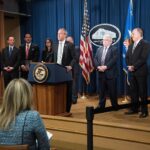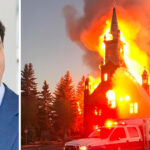Blog Post
Attorney General William Barr sides with Christians fined for attending parking lot service
Attorney General William Barr is easily America’s foremost defender of religious liberty. Last fall, he detailed his view on the threats to religious freedom in a powerful speech to the Law School and the de Nicola Center for Ethics and Culture at the University of Notre Dame, laying out why be believes Judeo-Christian values are fundamental to the survival of the United States of America and why secularist attacks on religious freedom are so dangerous:
In fact, Judeo-Christian moral standards are the ultimate utilitarian rules for human conduct.
They reflect the rules that are best for man, not in the by and by, but in the here and now. They are like God’s instruction manual for the best running of man and human society.
By the same token, violations of these moral laws have bad, real-world consequences for man and society. We may not pay the price immediately, but over time the harm is real.
Religion helps promote moral discipline within society. Because man is fallen, we don’t automatically conform ourselves to moral rules even when we know they are good for us.
But religion helps teach, train, and habituate people to want what is good. It does not do this primarily by formal laws – that is, through coercion. It does this through moral education and by informing society’s informal rules – its customs and traditions which reflect the wisdom and experience of the ages.
In other words, religion helps frame moral culture within society that instills and reinforces moral discipline.
I think we all recognize that over the past 50 years religion has been under increasing attack.
On the one hand, we have seen the steady erosion of our traditional Judeo-Christian moral system and a comprehensive effort to drive it from the public square.
On the other hand, we see the growing ascendancy of secularism and the doctrine of moral relativism.
By any honest assessment, the consequences of this moral upheaval have been grim.
Virtually every measure of social pathology continues to gain ground.
If you have a few moments, please do take the time to read through the whole thing—he essentially says what Dr. Charles Murray told me in our recent interview (which was published in the National Review), which is that absent a revival of religious values, America is in all likelihood doomed. (Rod Dreher wrote a column about my National Review piece, and predictably, he is even less optimistic than Murray is.) And this not just a conservative lawyer or Christian jurist–this is the Attorney General of the United States speaking.
Anyhow, that brings me to a story in the National Review this week by Alexandra DeSanctis, which has Barr defending encroachments on religious liberty by government officials who seem incapable of abusing their temporary powers during the COVID-19 pandemic:
On Tuesday, U.S. attorney general William Barr released a statement in opposition to coronavirus restrictions that openly disfavor religious organizations, focusing in particular on a regulation in Mississippi that imposed fines on congregants who attended a parking-lot worship service, even though they remained in their cars with their windows closed.
The City of Greenville fined congregants at Temple Baptist Church $500 per person for attending these services and listening to the service on the radio but allowed citizens to attend local drive-in restaurants, including with their car windows open. “The City appears to have thereby singled churches out as the only essential service (as designated by the state of Mississippi) that may not operate despite following all CDC and state recommendations regarding social distancing,” Barr wrote.
According to Barr’s statement and subsequent reporting from the Wall Street Journal, the City of Greenville later said that congregants would not be required to pay the fines, but the policy remains in place.
“The First Amendment and federal statutory law prohibit discrimination against religious institutions and religious believers,” Barr wrote. “Thus, government may not impose special restrictions on religious activity that do not also apply to similar nonreligious activity.”
He went on to state that if the government permits movie theaters, restaurants, or concert halls to remain open without restrictions, it may not close or impose restrictions on houses of worship. “Religious institutions must not be singled out for special burdens,” he added. In conjunction with Barr’s statement, the Department of Justice filed a statement of interest in support of the Mississippi church where the parking-lot service in question was held, taking the church’s side in its lawsuit filed against the City of Greenville in U.S. district court.
The DOJ statement of interest noted that the U.S. has an interest in “the preservation of its citizens’ fundamental right to the free exercise of religion, expressly protected by the First Amendment,” as well as that the case involves the “interplay between the government’s compelling interest in protecting public health and safety from COVID-19 and citizens’ fundamental right to free exercise of religion.”
Citing the Supreme Court ruling in the case Church of the Lukumi Babalu Aye v. City of Hialeah, the statement adds, “If the Court determines that the city’s prohibition on drive-in church services is in fact not the result of the application of a generally applicable and neutral law or rule, then the Court may sustain it only if the city establishes that its action is the least restrictive means of achieving a compelling governmental interest.”
In other words, the City of Greenville policy is subject to strict scrutiny, so the city must establish that the policy is driven by a compelling government interest, that it is narrowly tailored to accomplishing that interest, and that the policy accomplishes that interest while using the means that are least restrictive of the right to free exercise of religion. Given that the city appears to be establishing harsh penalties for congregants and churches that aren’t violating CDC recommendations while ignoring more dubious behavior from local restaurants and their patrons, it will be difficult to establish that the policy has met the last part of that equation.
It is hard to know precisely what to make of all of these lockdown restrictions, especially as experts are increasingly conflicted, as well. But it does provide a bit of comfort to know that the attorney general understands religious liberty, understands threats to religious liberty, and is willing to step in when government officials step over the line.









“absent a revival of religious values, America is in all likelihood doomed.”
This is true for every country that has adopted secular humanism as its leading point of view.